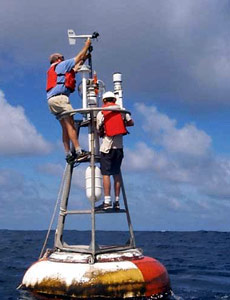Science vs. ignorance: Silicon Valley does Flipper


An international coalition of scientists is calling for a direct assault on ignorance. They actually want governments and science agencies to spend money to learn more about our oceans. With mild effrontery they predict humans could have very deep knowledge of our oceans and their creatures for about 2 to 3 billion dollars per year. Do not depress yourself by comparing that with how much the U.S. currently spends weekly for the Iraq occupation or on TV commercials for soap and credit cards.
As one scientist put it, "It's a hoary phrase that we know more about the surface of the moon than the deep ocean. It's true. The oceans are virtually unexplored."
Another scientist called for loosing Silicon Valley technology on the study of the oceans from top to bottom. There are 3,000 ARGOS-enabled platforms already on the earth's oceans. The scientific coalition is suggesting ten times that many would give a complete, real-time, constant view of the oceans and the weather and major activities occuring across the globe.
The ARGOS system already exists as the result of a French and American space agency agreement dating back to 1976. Other space agencies later joined in. There's now a commercial operation, CLSAmerica, that can build, place and maintain ARGOs-enabled platforms. They'd sure like to see more platforms around the world.
Here's where Flipper comes in: 4200 terrestrial and marine animals already carry little ARGOS transmitters. We can track reindeer in the Arctic, penguins in the Antarctic, albatross across the open sea. All from the comfort of a laptop in front of a comfy desk chair.
Why is this coming up now? Because this week there's a crucial science conference, November 28 and 29 in Cape Town. There national science organizations and agencies gather to discuss the needs for global research of our planet. It's a meeting of the Group on Earth Observations. The U.S. is still an active member, but don't tell the anti-evolutionists. They might not like all this untrammeled scientific curiosity.
Here's what GEO says on their website about this meeting, "Ministers and officials from over 100 governments and international organizations are assembling in Cape Town, South Africa from 28 to 30 November 2007 to advance an internationally agreed plan for building a Global Earth Observation System of Systems, or GEOSS."
They might actually ask for governments and QUANGOs to pony up the money for more ARGOS. And who knows? By 2009 a U.S. government might actually join in.